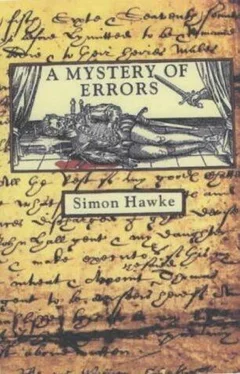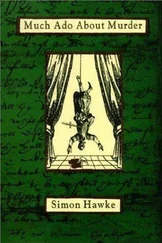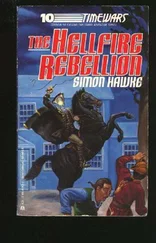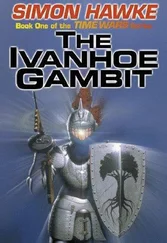Simon Hawke - A Mystery Of Errors
Здесь есть возможность читать онлайн «Simon Hawke - A Mystery Of Errors» весь текст электронной книги совершенно бесплатно (целиком полную версию без сокращений). В некоторых случаях можно слушать аудио, скачать через торрент в формате fb2 и присутствует краткое содержание. Жанр: Исторический детектив, на английском языке. Описание произведения, (предисловие) а так же отзывы посетителей доступны на портале библиотеки ЛибКат.
- Название:A Mystery Of Errors
- Автор:
- Жанр:
- Год:неизвестен
- ISBN:нет данных
- Рейтинг книги:3 / 5. Голосов: 1
-
Избранное:Добавить в избранное
- Отзывы:
-
Ваша оценка:
- 60
- 1
- 2
- 3
- 4
- 5
A Mystery Of Errors: краткое содержание, описание и аннотация
Предлагаем к чтению аннотацию, описание, краткое содержание или предисловие (зависит от того, что написал сам автор книги «A Mystery Of Errors»). Если вы не нашли необходимую информацию о книге — напишите в комментариях, мы постараемся отыскать её.
A Mystery Of Errors — читать онлайн бесплатно полную книгу (весь текст) целиком
Ниже представлен текст книги, разбитый по страницам. Система сохранения места последней прочитанной страницы, позволяет с удобством читать онлайн бесплатно книгу «A Mystery Of Errors», без необходимости каждый раз заново искать на чём Вы остановились. Поставьте закладку, и сможете в любой момент перейти на страницу, на которой закончили чтение.
Интервал:
Закладка:
“Marlowe!” Smythe said.
“Aye, Marlowe,” said Sir William, nodding. “Only they did not know his name.” He glanced at Shakespeare. “Alastair was posing as his brother Anthony, by then already slain, when Burbage, anxious to secure some patronage, rather bombastically introduced you to him as a man about to make his mark as England’s greatest poet, so Alastair thought you were the one. And there are some other similarities between you and Marlowe. You are both roughly the same age, both poets, both involved with companies of players… Well, Alastair at once went to meet with his sister and report what he had discovered. And they hired those men to kill you.”
“They very nearly did,” said Shakespeare.
“Indeed. ‘Twas fortunate that Tuck, here, became involved and followed them, or else they might well have succeeded.”
“But what puzzles me is what you were doing there, Sir William,” Smythe said.
“I was following you,” Sir William said.
“Me?” Smythe was astonished. “You followed me? But why?”
“Because, I am sorry to say, I had suspected you of being the one sent to dispose of Marlowe.”
“You thought that I was a hired killer?” Smythe said, scarcely able to believe it.
“Well, to borrow your theatrical terms, if I were to cast the role of an assassin, you would fill it admirably,” explained Sir William. “A stranger come to town with no connections, young, very fit, powerfully strong, and you at once sought employment with a company of players. Black Billy the brigand is an agent of mine who often enables me to keep track of who is coming to the city at certain times, when information reaches me through other sources that a spy or provocateur may be en route to London. If soldiers were to stop every coach and wagon coming into London along certain routes, there would be repercussions, and a spy might be prepared for that sort of thing. On the other hand, if a highwayman accosts them…”
“Then no one thinks twice about it,” Shakespeare said, realizing that Sir William had bent the truth a bit because of the Darcies’ presence. “And it does not alert anyone that coaches and wagons en route to London are being checked. Very clever, milord. Very clever, indeed.”
“But… you mean to say that you suspected all along that I might be an agent sent to murder Marlowe?” Smythe asked, incredulously.
“Or at the very least to discover who he truly was,” Sir William replied. “And then, perhaps, either dispose of him yourself or else oversee the task.”
“But you told me about Marlowe yourself!” said Smythe. “And you revealed…” he caught himself just in time. “You revealed certain other things to me, besides! Why do those things if you suspected me?”
“Because by then I had begun to have my doubts,” Sir William said. “I had begun to have them even before I had you investigated, Tuck, and I found out about your uncle, and about your childhood, and your father’s difficulties, and your burning desire to become a player. None of that seemed to fit the portrait of a hired Papist assassin. Most especially, you had never been abroad to Spain or France. And I also had another suspect. You see, Black Billy had robbed Sir Anthony’s coach shortly after he encountered you. And when his report reached me, I thought ‘twas quite a curious thing to find Sir Anthony on the road to London, when just the previous day, I had seen him at court. Of course, ‘twas not Sir Anthony at all, but Drummond bringing Alastair to London, probably from Bristol, where he had arrived by ship. So I surmised that Gresham had a double, perhaps a twin, but I still needed to be certain about you. And so I took a risk, and dangled Marlowe before you as bait to see if you would rise to it.”
“Was that not taking a dreadful chance with Marlowe’s life, milord?” asked Shakespeare.
“Aye, indeed,” Sir William said, “but when you play this sort of game, and for these sort of stakes, then you cannot afford to have much in the way of caution or scruples. And the truth of the matter is that Marlowe is as much of a liability as he is an asset. The things he says and does make it difficult to overlook his indiscretions. Especially since he brings so much attention to himself. He is a clever young man, and quite resourceful, but he is also very difficult, if not nearly impossible to manage. The Papists came to him while he was pursuing his studies at university and recruited him into their cause. He, in turn, came straight to us and offered to work against the efforts of the Counter-Reformation.”
“Us?” said Smythe.
“Her Majesty’s Secret Service,” said Sir William, “under Sir Francis Walsingham. And now, you realize, you are privy to knowledge that would cost you your heads if you were ever to reveal it.”
Elizabeth gasped and her father nodded gravely, to indicate that he understood the severity of this responsibility. “Neither my daughter nor I shall ever tell a soul!” he said, somberly.
“Nor I,” said Smythe, uneasily. Shakespeare swallowed nervously and nodded in agreement.
“Had I any doubts upon that score, then I should not have told you any of this,” Sir William said. “Besides, I have a feeling that you may all prove useful, should it ever come to pass that Her Majesty has need of you.”
“Angels and ministers of grace defend us!” Shakespeare said. “I would make a dreadful spy, milord! I fear I have not the mettle nor the constitution for it!”
Sir William smiled. “Then we shall try neither your mettle nor your constitution, Master Shakespeare. But we shall assay your constancy, methinks. There are many ways that one may serve.”
“If the queen should ever require my service, then it goes without saying that I am Her Majesty’s to command,” said Henry Darcie.
Shakespeare grimaced, wryly. “Aye, as are we all.”
Sir William turned to Smythe. “As for you, Tuck Smythe… we already have ample evidence of both your mettle and your constitution. And of your constancy, I have no doubt. Be a player, if such is your desire, though ‘twould seem to me that you have little talent for it. I think I may have work more suited to your skills. At the very least, there is still the matter of that sword you promised me.”
“I am at your service, milord,” said Smythe.
“Good. Then we shall speak again.” He stood to leave. “And now, ‘tis very late, and I shall leave you to your beds.”
“But, milord,” said Shakespeare, “what shall we tell the others of this matter on the morrow? They shall be full of questions about the causes behind all these strange events.”
“And I have no doubt that you shall have suitable answers for them that will satisfy their craving and yet still mask the truth,” Sir William said, putting on his hat and cloak. “After all, as Richard Burbage said, you are ‘soon to make your mark as one of England ’s greatest poets,’ Master Shakespeare.” He chuckled. “Look to your muse to serve you. And now I bid you all good night.”
As Sir William closed the door behind him, Henry Darcie and Elizabeth stood to leave, as well. “I must thank you for your service to my daughter, Mr. Smythe,” he said. Elizabeth, standing beside him, met Smythe’s gaze. “You believed in her when even her own mother and I did not.”
“Well, under the circumstances, sir, who could blame you?”
“I blame myself,” said Darcie. “I should have taken more trouble to examine the suitability of the match, to make inquiries, to… to…”
“Consider your daughter’s feelings?” Shakespeare suggested.
“Well…” Darcie grunted, clearly feeling that the poet was presumptuous, but not feeling in a position to say so. “That, too, I suppose. Again, my gratitude to you… gentlemen.” He gave them a curt bow and left. With a lingering glance back, Elizabeth followed her father.
Читать дальшеИнтервал:
Закладка:
Похожие книги на «A Mystery Of Errors»
Представляем Вашему вниманию похожие книги на «A Mystery Of Errors» списком для выбора. Мы отобрали схожую по названию и смыслу литературу в надежде предоставить читателям больше вариантов отыскать новые, интересные, ещё непрочитанные произведения.
Обсуждение, отзывы о книге «A Mystery Of Errors» и просто собственные мнения читателей. Оставьте ваши комментарии, напишите, что Вы думаете о произведении, его смысле или главных героях. Укажите что конкретно понравилось, а что нет, и почему Вы так считаете.












